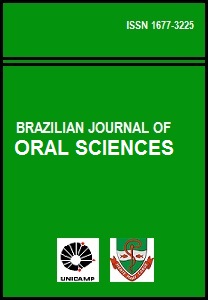Abstract
Aim: To describe cases of dental caries in Indian mother-child pairs of the middle and lower Xingu River – Xingu Indigenous Park. Methods: A total of 246 children aged 3-5 years old and their respective mothers took part in this study. Caries indexes dmft and DMFT were analyzed for deciduous and permanent dentitions, respectively, according to criteria proposed by the World Health Organization. Results: Analysis of the DMFT index showed a mean value of 14.3 for mothers. In mothers aged between 35 and 44 years, tooth loss accounted for more than 80% of the total index score. With regard to the children, dmft index was 4.7, on average, and only 13.4% were caries-free. No significant correlation was found between mother and child caries experience (p = 0.16). Conclusions: These results suggest that it is important to consider the community as a whole, and not only the mother, regarding the oral health of indigenous children. Community should be involved in the planning of strategies for caries prevention and health promotion, taking into account the socio-cultural complexity and specificities of indigenous population and adapt them to the local reality for these strategies to become actually effective.
This work is licensed under a Creative Commons Attribution 4.0 International License.
Copyright (c) 2015 Lucila Brandão Hirooka, Wilson Mestriner Junior, Soraya Fernandes Mestriner, Selma Aparecida Chaves Nunes, Pablo Natanael Lemos, Laércio Joel Franco
Downloads
Download data is not yet available.

